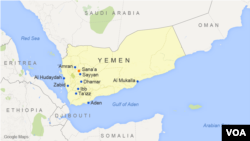The U.N. Children's Fund warns cholera cases and deaths in war-torn Yemen continue to mount and could reach 300,000 by the end of August. UNICEF puts the current number of suspected cases at nearly 200,000, including more than 1,200 deaths — with a quarter of those being children.
UNICEF says containing the cholera outbreak in Yemen is extremely difficult. It says the health system is near total collapse, water and sanitation systems are in disrepair and the people who are meant to care for patients, collect the garbage and maintain vital systems have not been paid for six months.
The UNICEF representative in Yemen, Meritxell Relano, says despite the obstacles, aid agencies are making progress in reducing cholera cases and deaths in some parts of the country.
Package of intervention
Speaking from Sana'a, she says UNICEF and partners are meeting with some success in preventing the spread of the disease in places where they have provided families and communities with a package of intervention.
She tells VOA the package includes household water purification.
“A team of people, they go house by house and they check the water sources that the family is using,” Relano said. “They chlorinate the water tanks if they have a water tank … and then they are informed about the ways to avoid cholera by providing good hygiene to the family — hand washing with soap, how to handle the food and how to handle a family that is sick with cholera or with diarrhea.”
Easily treated if caught quickly
Relano says it is important to know how to care for a patient because cholera is sometimes transmitted by the fluids of a sick person. Cholera, which is caused by contaminated food and water, is easily treated if caught quickly; however, it can kill in a matter of hours if left untreated.
The UNICEF representative says cholera cases are going down in 77 of the country's 333 districts where aid agencies have introduced the life-saving package of integrated measures. This past week, U.N. humanitarian chief Stephen O'Brien was quoted as saying Yemen's cholera outbreak was a “man-made” catastrophe caused by Yemen's warring sides and their international backers.





